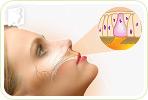Night sweats are one of the most common symptoms of menopause. Night sweats are caused by decreasing hormone levels during menopause, and can disrupt a woman's sleep and leave her covered in perspiration. Night sweats can be difficult to treat because there are so many different treatments available, and they all differ in effectiveness.
Causes of Night Sweats
Night sweats and their daytime counterpart, hot flashes, are caused by fluctuating levels of estrogen. Estrogen levels change dramatically during the years surrounding menopause and can cause the temperature regulator in the brain, the hypothalamus, to behave just as erratically. When estrogen levels fluctuate, the hypothalamus is misled into believing that the body's internal temperature is too hot, causing the body to sweat in an attempt to cool down.
Certain foods and habits can trigger night sweats or make them worse, including the following:

- Warm rooms
- Saunas
- Spicy food
- Poor air circulation
- Excessive consumption of caffeine, sugar, and alcohol
- Smoking
- Heavy, thick bedding
- Heavy pajamas made of synthetic fabrics
In rare cases, night sweats can also be caused by certain medications, infections, and even cancer. It may be a good idea to check with your doctor about the side effects of your medications or any underlying conditions.
How to Prevent Night Sweats
While it may be difficult to completely eradicate night sweats, there are a number of steps that women can take to help lessen the frequency and intensity of night sweats, such as the following lifestyle changes:

- Avoiding spicy food
- Limiting caffeine and alcohol intake
- Keeping a glass of ice water by your bed
- Keeping windows open and a fan running
- Using lightweight bedding
- Wearing lightweight and breathable pajamas
- Avoiding or quitting smoking
More Information
In addition to making adjustments in habits, regular exercise may also cut back on night sweats. Exercises like swimming laps, tai chi, and water yoga can be adapted to any fitness level and are good for overall health.
However, if your night sweats continue, it may be a good idea to talk to your doctor. One of the most prescribed treatments for night sweats is hormone replacement therapy (HRT). This treatment increases estrogen levels in the body and along with night sweats can also reduce hot flashes, vaginal dryness, and mood swings, but it may also produce side effects. Click on the following link to discover more about night sweat treatments.
Sources
- Mayo Clinic Staff. (2014). Night Sweats. Retrieved November 10, 2015, from http://www.mayoclinic.org/symptoms/night-sweats/basics/definition/sym-20050768
- National Health Service UK. (2014). Night Sweats. Retrieved November 10, 2015, from http://www.nhs.uk/conditions/night-sweats/Pages/Introduction.aspx



